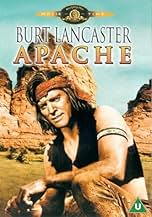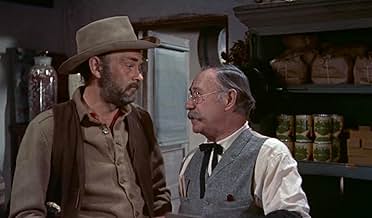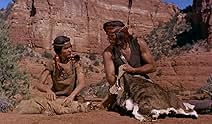IMDb-BEWERTUNG
6,3/10
5306
IHRE BEWERTUNG
Massai, ein Apachenkrieger, weigert sich, sich in ein Reservat in Florida umzusiedeln. Er entkommt seinen Entführern und kehrt in seine Heimat zurück, um ein friedlicher Farmer zu werden.Massai, ein Apachenkrieger, weigert sich, sich in ein Reservat in Florida umzusiedeln. Er entkommt seinen Entführern und kehrt in seine Heimat zurück, um ein friedlicher Farmer zu werden.Massai, ein Apachenkrieger, weigert sich, sich in ein Reservat in Florida umzusiedeln. Er entkommt seinen Entführern und kehrt in seine Heimat zurück, um ein friedlicher Farmer zu werden.
- Regie
- Drehbuch
- Hauptbesetzung
Charles Bronson
- Hondo
- (as Charles Buchinsky)
Dehl Berti
- Cherokee Householder
- (Nicht genannt)
Paul E. Burns
- General Store Proprietor
- (Nicht genannt)
Lonnie Burr
- Indian Boy
- (Nicht genannt)
Jerado Decordovier
- Apache
- (Nicht genannt)
John George
- Shoeshine Man
- (Nicht genannt)
Anne Kunde
- Townswoman Leaving Trading Post
- (Nicht genannt)
Rory Mallinson
- Citizen Noticing Handcuffs
- (Nicht genannt)
Mort Mills
- Sergeant of the Guard Fort.
- (Nicht genannt)
Empfohlene Bewertungen
The movie tells the story of a rebellious apache who refuses to surrender with his chief Geronimo,and wages a one-man war against the U.S. cavalry.
Following movies like "Broken Arrow (1950)" this film takes the side of the Indian.Lancaster is again at his most athletic in the leading role,but he makes a rather unlikely Indian.The same could be said of Jean Peters,who nevertheless looks ravishing as Lancaster's squaw.It's anyway an entertaining movie.
Following movies like "Broken Arrow (1950)" this film takes the side of the Indian.Lancaster is again at his most athletic in the leading role,but he makes a rather unlikely Indian.The same could be said of Jean Peters,who nevertheless looks ravishing as Lancaster's squaw.It's anyway an entertaining movie.
Apache was the third feature Robert Aldrich directed. Before he worked as an assistant director to Jean Renoir, William Wellman, Lewis Milestone and even Charlie Chaplin and also made several episodes for TV films. He was invited to direct Apache by its co-producer and main star Burt Lancaster.
The Apache's particularity is that it doesn't enter the classic Western scheme of almost obligatory showing of the Indians as bad guys, thou the most illustrious example of this probably belong to John Ford's 1964 Cheyenne Autumn with which the legendary director bid a farewell to the genre. Also Apache's distinctiveness resides in the treatment that is given to the central theme of the Western genre, which is revenge.
Here the Indian rebellious warrior Massai, wonderfully played by Burt Lancaster is obsessively seeking revenge facing the enemy not only in a form of one person or a small group of people in accordance with traditional Western vengeance system, but in a form an entire society either Indian or White, a society that he considers his enemy and against which he courageously fights alone not looking for help from anyone till he meets an equally strong character Nalinle (Jean Peters), a woman who simply accepts him as he is ready to share all the difficulties of Massai's life and even to sacrifice her own life for the man she loves. From this point on as his affection for Nalinle increases, his desire to fight everything and everyone proportionally decreases resulting in his settling down looking for more peaceful existence, which is hardly possible due to the burden of his past deeds which weighs over him personified in a collective figure of the American authorities who unceasingly continue to hunt him down.
A weak, but also in many ways remarkable Western featuring convincing performances from Burt Lancaster and Jean Peters in a tale of self-sacrificing love and courageous but ultimately pointless fight for imaginary cause. 7/10
The Apache's particularity is that it doesn't enter the classic Western scheme of almost obligatory showing of the Indians as bad guys, thou the most illustrious example of this probably belong to John Ford's 1964 Cheyenne Autumn with which the legendary director bid a farewell to the genre. Also Apache's distinctiveness resides in the treatment that is given to the central theme of the Western genre, which is revenge.
Here the Indian rebellious warrior Massai, wonderfully played by Burt Lancaster is obsessively seeking revenge facing the enemy not only in a form of one person or a small group of people in accordance with traditional Western vengeance system, but in a form an entire society either Indian or White, a society that he considers his enemy and against which he courageously fights alone not looking for help from anyone till he meets an equally strong character Nalinle (Jean Peters), a woman who simply accepts him as he is ready to share all the difficulties of Massai's life and even to sacrifice her own life for the man she loves. From this point on as his affection for Nalinle increases, his desire to fight everything and everyone proportionally decreases resulting in his settling down looking for more peaceful existence, which is hardly possible due to the burden of his past deeds which weighs over him personified in a collective figure of the American authorities who unceasingly continue to hunt him down.
A weak, but also in many ways remarkable Western featuring convincing performances from Burt Lancaster and Jean Peters in a tale of self-sacrificing love and courageous but ultimately pointless fight for imaginary cause. 7/10
I grew up watching westerns so in turn love them dearly....they tie me in with a great childhood when things were simple and life was good in an unadulterated sense.
Burt Lancaster has always been a prominent actor and his talent is so very showing in this movie. Charles Bronson is also in the movie and comes across very well as a young actor who is later destined to be one of the greatest actors of our time. I thoroughly enjoyed watching this movie on a lazy Saturday afternoon and I highly recommend it for its soothing effects of a simple yesteryear long gone except in cinema.
It is a typical plot of indians being pushed out and destroyed by the Union Army with one stand out rebel.....hell bent with an anger created thru intense hate, yet capable of showing love towards the woman in his life.
Burt Lancaster has always been a prominent actor and his talent is so very showing in this movie. Charles Bronson is also in the movie and comes across very well as a young actor who is later destined to be one of the greatest actors of our time. I thoroughly enjoyed watching this movie on a lazy Saturday afternoon and I highly recommend it for its soothing effects of a simple yesteryear long gone except in cinema.
It is a typical plot of indians being pushed out and destroyed by the Union Army with one stand out rebel.....hell bent with an anger created thru intense hate, yet capable of showing love towards the woman in his life.
If you can suspend disbelief that Burt Lancaster and Jean Peters are Apaches, then this isn't a bad western. If you can't, well then there's gonna be a lot of low ratings posted here.
In 1886, Geronimo and his braves surrender to the U.S. Calvary in New Mexico and are shipped off to Ft. Marion, Florida. All except one, an Apache named Massai (Burt Lancaster) who begins a one man war against the whites.
Massai escapes from the train that is shipping the Apaches back east and makes his way back to New Mexico. From there, he attacks wagons, soldiers, bridges etc., making life hard for the authorities. He kidnaps Nalinle (Jean Peters) and takes her up to the hills with him while Indian scouts John McIntire and Charles Bronson hunt them down.
Massai finds an isolated spot in the high country and starts to plant a small corn field from seed he got from a Cherokee farmer (Morris Ankrum). He also gets Peters pregnant with child.
The ending scene in Massai's little cornfield is pure Hollywood. The action scenes are tight as we see Lancaster jumping from rock to rock as he picks off at least 10 of the Indian scouts that have him surrounded. But then as Massai is wounded and runs into McIntire in the cornfield, disbelief occurs and the conclusion seems tacked on in order to make a happy ending out of it. You'll have to see it for yourself.
Still, it's entertaining enough as it is. It's based on a true incident and Lancaster at least brings some dignity to his role as the noble warrior turned farmer who wants to be left in peace. It could've turned out a lot worse.
I give it a 6 out of 10 for his performance alone.
In 1886, Geronimo and his braves surrender to the U.S. Calvary in New Mexico and are shipped off to Ft. Marion, Florida. All except one, an Apache named Massai (Burt Lancaster) who begins a one man war against the whites.
Massai escapes from the train that is shipping the Apaches back east and makes his way back to New Mexico. From there, he attacks wagons, soldiers, bridges etc., making life hard for the authorities. He kidnaps Nalinle (Jean Peters) and takes her up to the hills with him while Indian scouts John McIntire and Charles Bronson hunt them down.
Massai finds an isolated spot in the high country and starts to plant a small corn field from seed he got from a Cherokee farmer (Morris Ankrum). He also gets Peters pregnant with child.
The ending scene in Massai's little cornfield is pure Hollywood. The action scenes are tight as we see Lancaster jumping from rock to rock as he picks off at least 10 of the Indian scouts that have him surrounded. But then as Massai is wounded and runs into McIntire in the cornfield, disbelief occurs and the conclusion seems tacked on in order to make a happy ending out of it. You'll have to see it for yourself.
Still, it's entertaining enough as it is. It's based on a true incident and Lancaster at least brings some dignity to his role as the noble warrior turned farmer who wants to be left in peace. It could've turned out a lot worse.
I give it a 6 out of 10 for his performance alone.
Apache is one of the first Hollywood films which dealt in a serious, thought-provoking and openly sympathetic way with the suffering of the native Americans as a consequence of the white man's expansion to the West. It is interesting to watch this film side by side with, for instance, John Ford's silent classic The Iron Horse, as we can see two opposite approaches to the history of the American West in the late 19th century. While Ford's epic production is a hymn to white man's progress and to the expansion of civilization to the wild, unexplored territories of the United States inhabited by the Indian nations, Apache is a touching drama about the desperate fight for survival of those same Indians, who were ruthlessly driven out of their ancestral lands and ways of life by the stern advance of material progress. The plight of the Apache nation is embodied by the central character of the film, the strong, stubborn, freedom-loving and nobly human Indian warrior Massai, played by the actor Burt Lancaster, who was also the inspirer and producer of the film. Unwilling to accept personal slavery and what he deems as the total humiliation of his nation after Chief Geronimo's surrender to the U.S. Army and the confinement of the Apache tribes to the reserve, Massai decides to start a one-man fight for human dignity and freedom and becomes a solitary outlaw at war with the local U.S. Army garrison.
The film is certainly worth watching, not only because of the human interest of the story itself, but also as a well-crafted piece of cinema. Apache is the first great movie by the director Robert Aldrich, who in that year of 1954 would score double and reward us with another masterpiece, the unforgettable Veracruz, also with a Burt Lancaster in absolute state of grace as an actor, this time teaming with the veteran Gary Cooper.If in Veracruz Lancaster gave as a memorable performance as the attractive villain Joe Erin, here he is no less powerful as the honest and indomitable warrior Massai. At his side, also good performances by Jean Peters in the role of the faithful, ever-loving and determined squaw Nalinle, and John McIntire as the hard-boiled, cynical Indian-hunter Al Sieber, in a role that prefigures the twilight heroes of Peckinpah's films.
All in all, a classic of the Western genre which inaugurated Aldrich's later shining career.
The film is certainly worth watching, not only because of the human interest of the story itself, but also as a well-crafted piece of cinema. Apache is the first great movie by the director Robert Aldrich, who in that year of 1954 would score double and reward us with another masterpiece, the unforgettable Veracruz, also with a Burt Lancaster in absolute state of grace as an actor, this time teaming with the veteran Gary Cooper.If in Veracruz Lancaster gave as a memorable performance as the attractive villain Joe Erin, here he is no less powerful as the honest and indomitable warrior Massai. At his side, also good performances by Jean Peters in the role of the faithful, ever-loving and determined squaw Nalinle, and John McIntire as the hard-boiled, cynical Indian-hunter Al Sieber, in a role that prefigures the twilight heroes of Peckinpah's films.
All in all, a classic of the Western genre which inaugurated Aldrich's later shining career.
Wusstest du schon
- WissenswertesMassai was born to Little Sun and White Shadow at Mescal Mountain, Arizona, near Globe. He later met Geronimo, who was recruiting Apaches to fight American soldiers. He also knew the Apache Kid. The policy in Arizona at the time was to exterminate hostile Apaches. Many Apache warriors fought for their people and traditions, fleeing and waging effective guerrilla warfare against their enemies.
Massai escaped over the border to Mexico, eventually settling in the Sierra Madre mountains in Sonora Mexico with a camp of rebellious Chiricahuas who had refused to surrender with Geronimo. Nothing is known of his final days.
- PatzerAbout 16 minutes into the movie as Massai (Burt Lancaster) is fleeing from the white mob through a hotel corridor you can see an unlit electric 'EXIT' sign visible in the hallway at the top of the shot.
- Crazy CreditsOpening credits: This is the story of Massai, the last Apache warrior. It has been told and re-told until it has become one of the great legends of the Southwest. It began in 1886 with Geronimo's surrender.
- VerbindungenFeatured in Bearing Witness, Native American Voices in Hollywood (2024)
Top-Auswahl
Melde dich zum Bewerten an und greife auf die Watchlist für personalisierte Empfehlungen zu.
- How long is Apache?Powered by Alexa
Details
Box Office
- Budget
- 1.240.000 $ (geschätzt)
- Weltweiter Bruttoertrag
- 7.228 $
- Laufzeit
- 1 Std. 31 Min.(91 min)
- Seitenverhältnis
- 1.37 : 1
Zu dieser Seite beitragen
Bearbeitung vorschlagen oder fehlenden Inhalt hinzufügen





































